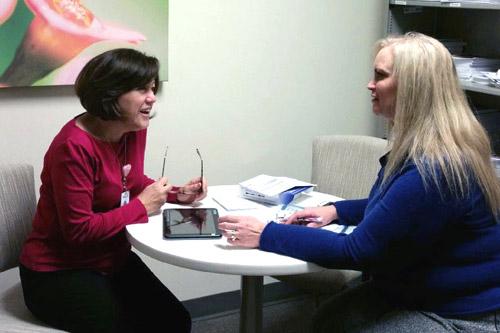
FORT SMITH — Former Christ the King preschool teacher Norma Nelson has found a new career in retirement: teaching Hispanic woman about breast cancer prevention.
Mercy Hospital Fort Smith’s mobile mammography unit had been reaching approximately 1,600 women a year throughout its 13-county service region, but it wanted to do better, especially among Hispanic women. Nelson, who moved to the United States from Mexico in 1980 and who has close ties to the Hispanic community and area parishes, was a natural fit for the part-time outreach coordinator position.
“Mercy wanted to hire someone like me because they saw that Hispanic women were not coming for mammograms, and when they did come they were already very sick,” Nelson said. “They were afraid because they didn’t speak English, and some might not have been documented.”
In her new position, Nelson is attending health fairs and speaking at churches, public school PTA meetings, adult education centers and the public library.
“I show a Spanish language film that explains exactly what the mammogram is and how important it is for women to have regular mammograms after age 40,” she said. “I let them know that there are funds to help women who are uninsured receive free mammograms, and that if cancer is detected, we will set them up with agencies who will help them.”
She also rides in the mobile mammography unit, serving as a translator and helping women fill out forms. She teams up with nurse navigator Gina Hull in the mobile unit.
“Gina is called a navigator because she knows all about the community and hospital resources that are available to help women if they learn they need further medical care,” Nelson said.
According to the American Cancer Society, cancer accounts for 21 percent of all deaths in the Hispanic community. One out of every six Hispanic women will die from cancer, and one out of three will be diagnosed with cancer during her lifetime. Breast cancer is the most commonly diagnosed cancer in Hispanic women.
“It is so important for women to begin early detection at age 40,” Nelson said, “because in younger women cancers are more aggressive.”
At a recent meeting in the Fort Smith Public Library, Nelson was joined by a cancer survivor who wanted to share her story and encourage women to get mammograms. Maria Balderas, who has three young children, was diagnosed with cancer at age 43.
“I had no knowledge of breast cancer before my diagnosis,” she said. “I have gone through surgery, chemotherapy and radiation. My goal is to educate myself about breast cancer so I can educate other women, to keep fighting and share about the changes in my life and my children’s lives.”
Balderas said cancer had made her a stronger person, and that meetings at the Donald W. Reynolds Cancer Support House in Fort Smith had connected her to a community of fighters and survivors. She encouraged women to do monthly self-examinations and get checked out if they detected any abnormalities and praised the “To Save a Life” program at Mercy Fort Smith.
“I think the program Norma Nelson is working with is very important,” she said. “Norma taught me the symptoms of early stage breast cancer and showed me it can happen to anyone. She is important to me because I discovered there is help out there; you just have to ask for it and you’ll find it. I want to thank God for putting a lot of angels like Norma at my side.”
Nelson’s outreach has increased use of mobile mammography at Mercy by 11 percent, and, as she is able to reach out to outlying counties, she hopes to reach even more women.
“My degree was in early childhood education,” she said, “but I am learning more and more about breast cancer each day and finding the transition to becoming an adult health educator is helping change women’s lives.”
Please read our Comments Policy before posting.
Article comments powered by Disqus St. Theresa girls’ basketball: there’s no ‘i’ in ‘team’
St. Theresa girls’ basketball: there’s no ‘i’ in ‘team’
 'What's going to happen?': 'Dreamers' in legal limbo
'What's going to happen?': 'Dreamers' in legal limbo
 Sister Dominica Wise, OSB, died July 22 at 92
Sister Dominica Wise, OSB, died July 22 at 92
 Arkansas' Catholic hospitals tackle nursing shortage
Arkansas' Catholic hospitals tackle nursing shortage
 Two schools put preschool kids on a bilingual path
Two schools put preschool kids on a bilingual path
 Winning directory photo honors Our Lady of Guadalupe
Winning directory photo honors Our Lady of Guadalupe
 St. Paul says: How does the Bible define love?
St. Paul says: How does the Bible define love?
 6 steps to getting married in Diocese of Little Rock
6 steps to getting married in Diocese of Little Rock
 Most frequently asked questions on Catholic marriage
Most frequently asked questions on Catholic marriage
 St. Joseph a model of solidarity with immigrants
St. Joseph a model of solidarity with immigrants
 Two gifts after Jesus’ death: Virgin Mary and Eucharist
Two gifts after Jesus’ death: Virgin Mary and Eucharist
 Why we have an altar, and not just a communion table
Why we have an altar, and not just a communion table
 Pope: Wars should be resolved through nonviolence
Pope: Wars should be resolved through nonviolence
 Living relationship with Jesus Christ in the Eucharist
Living relationship with Jesus Christ in the Eucharist